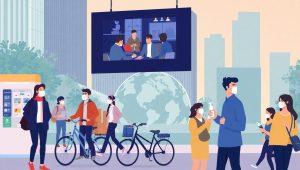
The COVID-19 pandemic has profoundly reshaped how we live, work, and interact with the world around us. What was once considered normal has been replaced by a “new normal,” where safety measures, digital transformation, and collective resilience play pivotal roles. Navigating this new reality requires adaptability, awareness, and a commitment to global cooperation.
Adapting to a Health-Conscious Lifestyle
The pandemic has heightened global awareness of health and hygiene. Practices such as frequent handwashing, wearing masks, and maintaining physical distance have become second nature for many. Public spaces now emphasize cleanliness and sanitation, and individuals are more vigilant about symptoms of illness, opting to stay home when unwell.
Vaccination campaigns have played a crucial role in controlling the spread of the virus, allowing societies to rebuild with a stronger sense of security. Governments, healthcare providers, and organizations continue to stress the importance of vaccines and boosters as a tool to protect individuals and communities.
Digital Transformation and Remote Connectivity
The shift to remote work, education, and telemedicine has accelerated digital transformation across the globe. Businesses have adopted flexible work models, blending in-office and remote work to maintain productivity while prioritizing employee safety. Virtual meetings, cloud-based collaboration tools, and online learning platforms have become essential to daily life.
This digital pivot has also extended to healthcare. Telehealth services allow patients to consult with doctors from the safety of their homes, and contactless delivery of medications ensures that people can access care without unnecessary exposure. The adoption of these technologies has improved accessibility and convenience, reshaping industries for the better.
Challenges of Mental Health and Resilience
The pandemic has brought mental health into sharper focus. Isolation, uncertainty, and grief have taken a toll on many individuals, highlighting the importance of emotional well-being. Governments and organizations have increased their efforts to provide mental health support, from hotlines and counseling services to workplace wellness programs.
Resilience has become a cornerstone of navigating the new normal. Communities have shown remarkable adaptability, supporting one another through initiatives such as mutual aid groups and charitable programs. Acts of kindness, whether delivering groceries to vulnerable neighbors or supporting local businesses, have strengthened bonds and fostered a sense of unity.
Global Cooperation and Preparedness
COVID-19 has underscored the interconnectedness of our world. International collaboration on vaccine development, distribution, and public health strategies has demonstrated the power of collective action. However, disparities in access to healthcare and resources remain a pressing challenge. Efforts to address these inequities are vital to ensuring a more equitable and prepared global community.
Preparedness for future pandemics is another key lesson from COVID-19. Investments in healthcare infrastructure, research, and rapid response systems are essential to mitigate the impact of future health crises. Strengthening global partnerships and sharing knowledge will enable countries to respond more effectively to emerging threats.
Living with the New Normal
As the world adjusts to life alongside COVID-19, there is a growing understanding that normalcy does not mean a return to the past but rather a reimagining of the future. People are embracing flexibility, innovation, and a greater appreciation for the present moment.